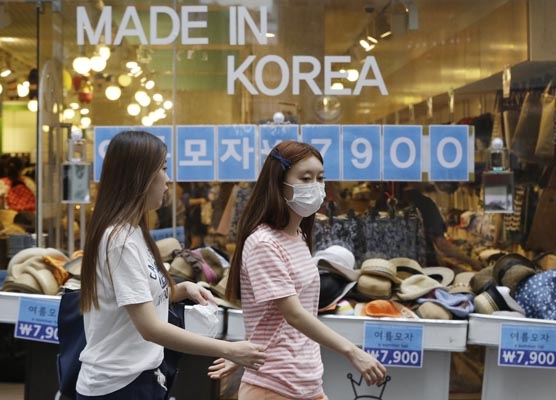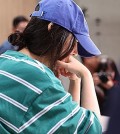- California Assembly OKs highest minimum wage in nation
- S. Korea unveils first graphic cigarette warnings
- US joins with South Korea, Japan in bid to deter North Korea
- LPGA golfer Chun In-gee finally back in action
- S. Korea won’t be top seed in final World Cup qualification round
- US men’s soccer misses 2nd straight Olympics
- US back on track in qualifying with 4-0 win over Guatemala
- High-intensity workout injuries spawn cottage industry
- CDC expands range of Zika mosquitoes into parts of Northeast
- Who knew? ‘The Walking Dead’ is helping families connect
S. Korea reports no new MERS cases for 9th day

A woman wearing a mask as a precaution against Middle East Respiratory Syndrome (MERS) walks in a shopping district in Seoul, South Korea. South Korea’s central bank cut its economic growth forecast Thursday, citing a severe drought and the spread of the MERS.(AP Photo/Ahn Young-joon)
SEJONG, July 14 (Yonhap) — The number of people diagnosed with Middle East Respiratory Syndrome (MERS) in South Korea remained unchanged at 186 on Tuesday as the country has seen no new cases for nine straight days, the government said.
The MERS death toll also stayed unchanged at 36, with no fatalities occurring since Friday, according to the Ministry of Health and Welfare.
There were 410 people in isolation as of Tuesday as suspected cases following possible exposure to the MERS coronavirus, down 41 people from the day before, it said.
Since the country reported its first case on May 20, nearly 16,700 people have been subject to isolation for possible infection. So far, 16,278 of them have been released after showing no symptoms of MERS for more than the known maximum incubation period of 14 days for the disease.
Out of those diagnosed with MERS, 131 have been discharged from hospitals following complete recoveries, up one compared with the day before.
Of the remaining 19 receiving treatment in hospitals, four are in unstable condition.
MERS is a viral respiratory disease that is still fairly new to humans. The disease has claimed over 530 lives globally, posting a fatality rate of over 36 percent.
In South Korea, the fatality rate stands at 19.4 percent, with most of the people succumbing to the illness having had underlying medical conditions. The ministry said 91.7 percent of the people who died were being treated for cancer or had serious heart, lung or kidney conditions.
There currently is no vaccine or treatment for the disease that was first reported only in 2012 in Saudi Arabia.















